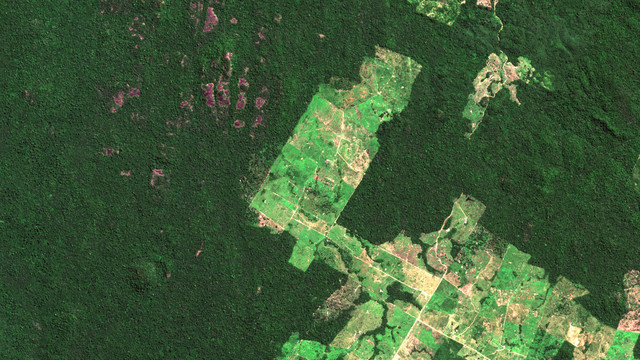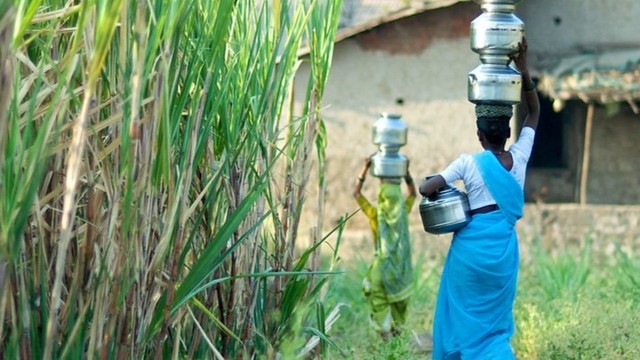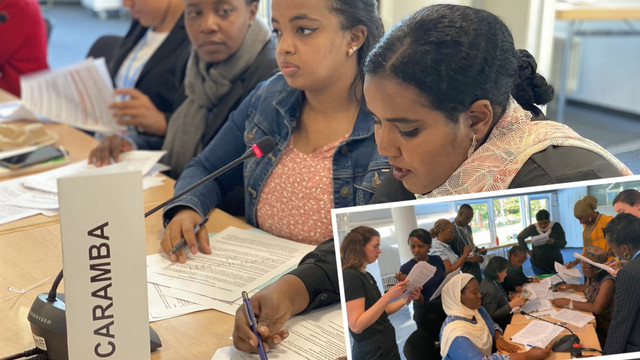Telling a different story – 'Everything That Rises: A Climate Change Memoir'
Brianna Craft discusses her new memoir 'Everything That Rises', a personal take on IIED’s work supporting the Least Developed Countries’ Group in the UN climate negotiations


IIED's Brianna Craft, Marika Weinhardt (hidden in the centre) and Janna Tenzing are captured on news footage celebrating the moment when the Paris Agreement was signed in 2015. The trio supported the Least Developed Countries Group at COP21
I get that ‘love story’ is a description people might not be expecting. Everything That Rises is a climate change memoir about negotiating the Paris Agreement. It describes IIED’s technical support to the Least Developed Countries’ Group. And writing love stories is not in my job description as senior researcher.
Nevertheless, a love story it is. My memoir is about the people I love. And what we all need to do to protect each other and our shared home.
My tipping point
I can pinpoint the moment that prompted me to write the book.
I’m part of the team that supports the LDC Group, which represents about one billion people living in the world’s 46 poorest countries, as classified by the United Nations. The least developed countries have done the least to cause the climate crisis – emitting less than 1% of global emissions – and are disproportionately impacted by the havoc it wreaks. Their people are five times more likely to die in natural disasters worsened by climate change.
I’ve worked closely with LDC Group delegates – among them some truly amazing people − at the UN climate change negotiations since 2011. Over the next four years, we worked long hours to negotiate the first universal, legally binding treaty on climate change.

There's not enough chairs (or space) as the LDC Group negotiators and advisors read the latest version of negotiations text for the Paris Agreement in 2015. Brianna Craft is seated on the floor, third right (Photo: Matt Wright, IIED)
The adoption of the Paris Agreement in 2015 was a huge moment. For me and the IIED team seated in the plenary. For our colleagues in the LDC Group. For the entire world.
But just months later, newly-elected President Trump made good on his campaign promise to withdraw the United States – my home country and the world's greatest source of greenhouse gas emissions – from the treaty.
That was the moment. The injustice of this betrayal left me distraught. Suddenly, I needed every American to hear me. To see what we and our LDC colleagues had worked so hard to accomplish and understand what was about to be thrown away.
So I started writing something different. Something I’d not written before. Something that got across not just the world of the UN, but the reasons why we must do something. Why the climate crisis emotionally impacts me so much – and this too is probably different than what people expect.
Violence, abuses of power and parallels
My father was violent, and I grew up terrified. In fact, the memoir opens with a recurring dream I had as a child that my dad was going to kill me. The more I came to experience the climate crisis and the power dynamics around it, the more I’m reminded of what it was like living with him: the stress and the fear – the constant risk of death. The pressure and despair that impacts and underlies everything. The anxiety that kept me up at night.
Watching the LDC Group push for adequate international decisions – ones that reduce emissions quickly enough and provide desperately needed support to the most vulnerable – reminds me of growing up in an abusive household. How every day I witnessed those with power undervalue things that were precious, irreplaceable. Treat them as worthless.
In the UN climate negotiations, countries that have caused the most damage actively negotiate against stopping the violence: they back out of their pledges, they walk away, they don’t deliver. And those who are being impacted are not empowered to hold them to account.
We don’t talk about abuse, in part because doing so would mean owning up to reality and the part we play in its perpetuation. By weaving these stories together, I’m hoping people will see the injustice of the climate crisis in a new way.
The power of love
Writing this book was difficult for me – spending time comparing climate violence and domestic violence was not fun. But the analogy did point to what we must do. What ultimately made the difference for me. And what now, when confronted with the threat and injustice of climate change, inspires me to try something different. What inspires the LDC Group to keep pushing for international solutions against all odds.
Love. We are trying to protect the people we love. I know I'm desperate to.
I have been blessed with rich friendships. My memoir is a story about a childhood best friend, a mom who's still here, about university friends who still call me by the nicknames they gave me. It’s about the work colleagues who became my chosen family when I immigrated to the UK.
I came of age in the UN climate negotiations. I went from looking to others for solutions, to advocating for those I love, myself. Theirs is the laughter and connection and hope that makes life worth living. Worth protecting even when that means making big changes.
This book is about doing everything within our power to protect the people we love.
I want readers to be inspired – as I have been – by those people pushing passionately, tirelessly, desperately, for international solutions to the climate crisis, against all odds.
I hope readers will use their voice and power to shape our collective response to the climate crisis. That they vote to elect officials who will cut greenhouse gas emissions to net zero. That they protest climate inaction. And that they divest their time and their money from fossil fuels. It will take all of us working together to protect our loved ones and this precious home we all share.
Love is climate action.
Find out more
Join Brianna Craft and Marika Weinhardt for a discussion of 'Everything That Rises: A Climate Change Memoir' on Tuesday, 27 June, part of IIED’s events at London Climate Action Week 2023.



